#they die at the end of their arcs and their purpose for existing
Explore tagged Tumblr posts
Text
Hoyo has been so carefree trivialising death in recent years that with the "would result in the death of another group" foreshadowing, I completely expect us all to just break up and go our seperate ways by the end of things.
Fucking prove me wrong Hoyo. Prove me wrong and kill half the group of HI3 Part 2.
Xiao, Navia, everyone in part 1.5, Misteln, Tingyun, Firefly, Sunday. None of the deaths you've shown since Himeko have been real.
FUCKING PROVE ME WRONG.
Im kinda pissed because I dont buy this foreshadowing at all. Hoyo has completely trivialised the threat of death. I want to be proven wrong so badly but I just dont believe it any more.
They cant keep using the threat of death, show characters basically or certainly dying, and oh no actually that's just how the misunderstood creature transports characters between dream worlds.
Dont fucking use this threat if you're not going to act on it. Prove me wrong. Fucking do it Hoyo. Kill someone. 100%, 120%, 150% kill a beloved character permanently.
Or stop using the threat of death.
I am at my breaking point with this. They get no more freebies with the threat of death.
I am so fucking pissed. Stop using it, or actually fucking kill main characters permanently in HI3 Part 2.
#ranting about part 2#<- mute this if you want#misha and gallaghers deaths do not count#they die at the end of their arcs and their purpose for existing#their deaths have no impact on the story or really any impact on any characters#very little would change if they were still alive#meanwhile himeko sends kiana on an entire arc which would be vastly different if himeko survived
16 notes
·
View notes
Text

"I think the cycle only ends when you find the will to walk away."
Got a lot of Q's for this in my inbox. Figured I'd just address them here.
tw: mentions of suicide, suicidal ideation
Re: the ending of S2:
Jinx did not die.
She symbolically killed her old self, and with it, her last ties to the past that imprisoned her. She understood that for her sister to move on and live her life - be happy without guilt - she'd have to renounce the bonds that held them together.
Her talk with ghostly Silco was the 'sign-off' she'd been waiting for, ever his dutiful daughter. Throughout S2, she kept hoping he'd haunt her, and in doing so, offer some impetus given her aimlessness. Maybe just straight up boss her around, and tell her how she's supposed to exist now that he's no longer there to be a (subversive if loving) guiding hand.
But it was the promise of time (as represented by Ekko) healing old wounds, and the courage to feel, as she once had - a hopeful child with a hopeful future - that allowed Jinx to commit impetus to action.
Her blimp-ship in the climactic battle is a tribute to Isha - but also to the child in Jinx's own fractured psyche: Powder. She's letting both little girls have one last hurrah before she takes care of business - and cuts off the last oaths, duties and commitments that bind her to a past whose parameters she's outgrown.
Better still, she knows she's got the capacity to outgrow them.
That was the point of Jinx's arc with Isha, and why, no matter my misgivings on Isha's character herself, I found Jinx's trajectory towards a more nurturing and fun-loving figure more life-affirming and positive than the straightforward 'Daddy's Villain Goes Postal' shtick.
It's even why there's a minigame titled Jinx Fixes Everything. It's Jinx, struggling and stumbling, as she tries to rewrite her narrative, and finds in herself the capacity to do good.
To fix things that seem irreparably broken.
And to understand why she's reached this stage, we've got to let go of our tendency to project our own stuff onto Jinx (precious meow meow, unrepentant terrorist, manic pixie crazypants, edgy hot psycho) and acknowledge the purpose she plays in Arcane's thematic structure.
Jinx's character comes off as a death-seeker, and that's no shocker. She is hounded by terrible guilt and loss. She's got blood on her hands, and ghosts on her heels, and no matter what she does, she can't seem to be rid of them. Her inner mind's fractured, her mannerisms ooze pure chaos, and she seems a creature of pure feral impulse and no mercy.
That's the Jinx we're accustomed to seeing in S1 - except that's also both the front she's most likely to put on during that timeline, and the persona that is necessary for her to inhabit to survive, as Silco's daughter and his top enforcer.
Then Silco kicks the bucket, she symbolically fulfills his dream by shooting at the Council HQ, she accepts that she must inhabit this path of shadows and loneliness (as symbolized by her starkly decorated chair in the tea party scene), she accepts the fragmented push-and-pull between past and present, and...
And now what?
Silco's given her a semblance of direction for six years, and he's gone. Vi, the sister she'd hoped would return, and whom she'd hinged so many childishly idealized hopes on, is herself traumatized, and afraid of what her sister's become.
Jinx has her shadows and her loneliness. Jinx is traumatized. Jinx is suicidal.
But Jinx is still, whatever else, alive.
And all living things need connections.
That's why we as the audience enjoy her little found family dynamic with Isha and Sevika. It's Jinx, taking the first tentative steps to reach out to people beyond Silco and Vi, and realizing, wow, she enjoys the pay-off.
And all throughout S2, we see Jinx growing more and more comfortable in this newfound space - even jealously guarding it at the expense of Zaun's liberty, and Silco's wishes, because she can't bear to lose what she's found.
And what she finds empowers her enough that, when Warwick shows up, she's actually willing to reach out to Vi, and call upon their family connection, because Jinx is learning the value of bonds, not as baling hooks of guilt, but as buoys to carry her forward.
That's the story Jinx's relationships serve to tell in S2. Each one shapes the choice she makes in the finale. Until she learns to accept the past (Vi), to lay the monsters to rest (Silco and Vander/Warwick), forgive herself (Caitlyn) trust that time heals all wounds (Ekko), and hope for happier new beginning (Isha), she'll never trust herself enough to just seize the chance.
Jinx's culminating arc is not about death, much less self-erasure. It's about resurrection, and embracing the sublime chaos of a freed mind, and a lightened spirit. That's what she craves beyond simple death, and what her baptism by fire, blood and riverwater, has been about.
Each trial grinds her down into someone else. Someone new.
Someone closer to who she is meant to be, rather than who she's expected to be.
That's why she's so glad to make the sacrifice for Vi. She's not dying as an act of self-immolation. She's giving her sister - the one who's proven she'll never give up on her - the ultimate gift, and showing Vi that she deserves to live.
She needs Vi to live, so Jinx, the persona, can finally die.
"He (Silco) didn't make Jinx. You did."
She's basically saying, "I love you, I will always be with you, but you are no longer responsible for my actions. Please move forward with your life, and grant me the choice to do the same."
It's two sisters embracing everything they've meant to each other, acknowledging the pain weighing them down on both sides, and welcoming the new so they can each slough off old paradigms and live life as a whole person - or at least take steps to remembering what wholeness feels like.
That's the reason the show's final shots linger on the Hexgate tunnels, Jinx's monkey bomb, and the aircraft.
It's the show's way of reminding us that Jinx has ascended to a different version of her identity - one removed from the past that haunted her. It's Jinx, finally striking out alone, away from the sister whose memory she clung so desperately to, and who was, in turn, horrified by her hand in making Powder a monster (perceived guilt or real, fandom may debate ad nauseum) due to past mistakes and abandonment.
The ending of Arcane isn't tragic. It's deeply hopeful, and serves as a reminder that no matter how damaged you think you are, and no matter how monstrous the world finds you, there are still ways to come back to yourself - or to walk the path toward a new you.
Jinx is symbolized by crows. Jinx is shown with firelights emerging from her mouth. Jinx is depicted holding a torch like Janna ushering in the winds of change.
Thematically, Jinx is change.
And the best way she can embody that change is to write her story, and make it her own.
#arcane#arcane league of legends#arcane silco#silco#arcane vi#arcane violet#vi#violet#arcane jinx#jinx#arcane ekko#ekko#arcane vander#vander#arcane warwick#warwick#arcane season 2#arcane s2#tw: suidice#tw: sucidal thoughts#arcane timebomb#timebomb#jinx x ekko#arcane season two#league of legends
1K notes
·
View notes
Note
what was the destiny of wyll in your durge "canon" run? I mean this karlach piece made me really sad (in a good way its beautiful art as always) and got curious of how wyll's story ended. I mean since the "happiest" end we can get to karlach is having wyll going with her to avernus.
(Obligatory disclaimer that shouldn't be obligatory: My interpretations of these characters are my own, and are painted by the types of stories *I* find interesting. I'm not interested in being correct, only in having fun with the fiction.)
Wyll was there! But earlier in the release of the game you couldn't suggest that he join her in Avernus. You either went with her yourself, or allowed her to die - which, to be honest, I kind of like and feel as if that outcome fits in best with the themes of the game, hence why I haven't changed it despite how you're now able to save her that way. That said, this does mean that my Wyll is a man who did not make that offer, which is something I take into account for his character.
He did survive the entirety of the game and technically got everything that he wanted. He broke his contract with Mizora (at DU Drow's behest, bafflingly enough) AND still got to see his father safe and sound. I think he stays behind to help rebuild Baldur's Gate and follow in his father's footsteps - he remains set on his front of heroism but goes on to become more of a politic's man.
DU drow's perception of Wyll is probably the most enmeshed with my own intepretation of his character. Wyll puzzles me. I understand there was some tribulation behind his development which might be at fault, but his one-noteness is so well-performed that it can feel purposeful. I spent the whole game looking forward to that moment in his character's arc when he finally cracked - when he reveals the rogue justiciar's attitude to have been a facade this whole time, and how angry he is that the world (his world - Baldur's Gate, his father) doesn't see him how he sees himself - like one of the protagonists in the story books he read as a child. I wish he told you that, could he go back, he would have set the city ablaze.
But he never does that. He doesn't really go through a ton (if any) development. if anything he feels more and more helpless as the game goes on - which could make for a VERY interesting character, had that been explored.
And, minus the complexities, that's kind of the view DU drow had of him. All bark and no bite and someone who remained so strangely passive before his own fate that it frustrated him to the point of action. Of COURSE you want to break your contract with Mizora, are you crazy? Oh, your dad is here? Okay, fine, we'll get him I guess, maybe he'll talk some sense into you. You believe in some sort of fairy-tale undead dragon who will save the city? Fine, lets go take a look, maybe when you realize that isn't real you will finally snap out of this stupor you exist in.
This of course very much reflects my own desire to see what the hell Wyll's deal was by actually going through with his storyline, but retroactively it did also introduce this aspect of DU drow's character that wasn't there before - of a guy who will sometimes decide to do whats best for you out of spite.
Anyways. They don't get along.
266 notes
·
View notes
Text
i'd say interstellar song contest falls somewhere in between the zygon inversion and kerblam on similarly iffy politics.
actually let's compare this in more depth. because both the zygon inversion and kerblam feature revolutionaries who are presented as extremists who have "gone too far". but i still love the former story and hate the latter.
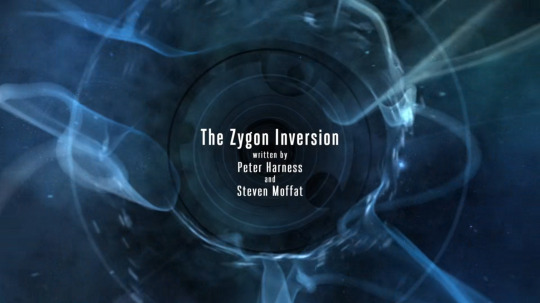
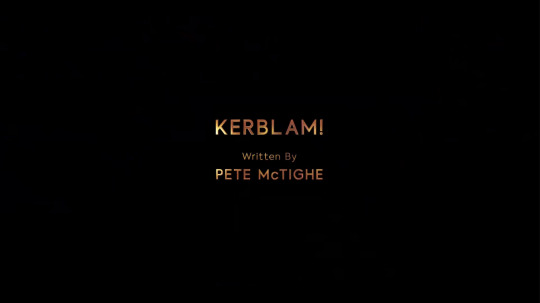
kerblam has charlie. inversion has bonnie. both are explicitly framed as rebels who want to overturn what they perceive as oppression. and both are framed as extremists whose ideologies are quickly dismissed as irrational and dangerous.
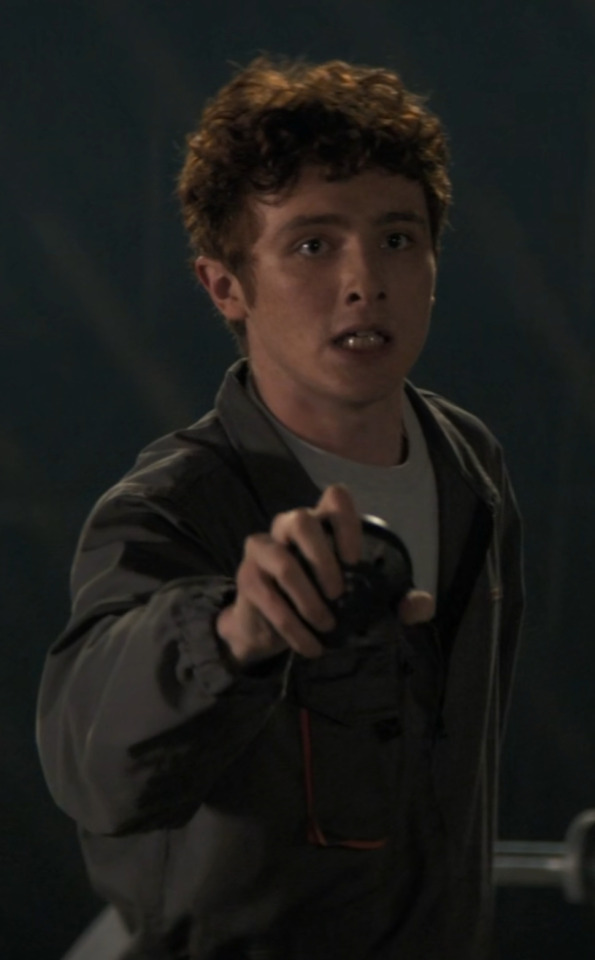
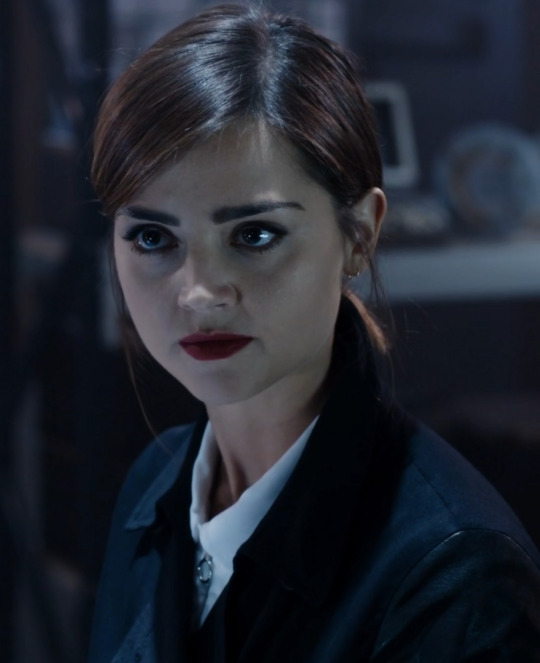
neither story meaningfully explores the root cause of rebellion. charlie’s automation-focused ideology is undercut while bonnie’s grievances are left vague or incoherent (treated like cattle how, bonnie? the story doesn't care enough to ask).
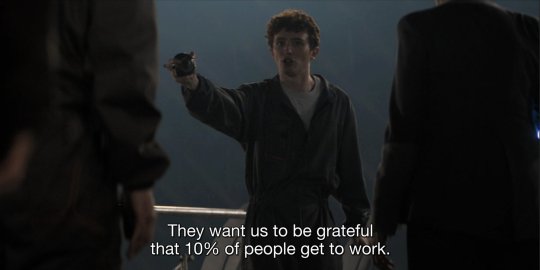
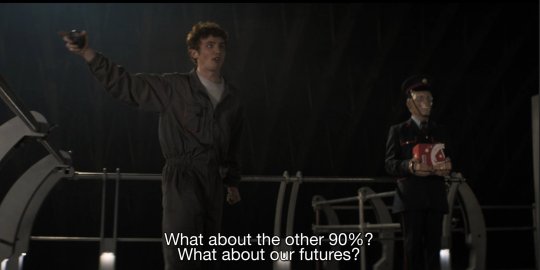
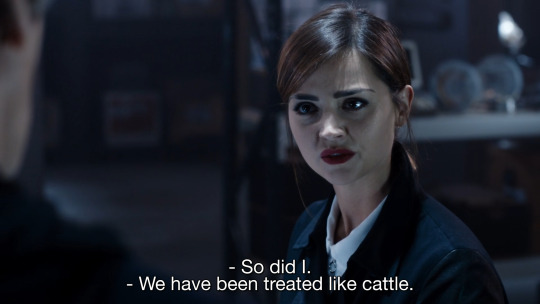
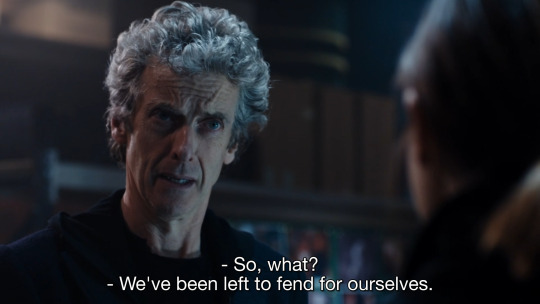
kerblam ends with vague reforms and no structural change. judy may propose the organisation becomes majority-organics, but there’s no guarantee anyone will listen. all of the worker characters die. the two bosses survive.
the background worker characters get one month off but only paid for two weeks. and instead of the horrible minimum-wage jobs being automated, they'll just hire more human workers to inflict further misery upon.

meanwhile; inversion sees the doctor enforce a fragile truce that resets the same failed peace repeatedly. kate’s memory has apparently been wiped multiple times. people keep getting slaughtered. each time, the doctor resets it to more or less how it was at the start.

both feature climaxes with the doctor confronting the antagonist; in both, the terrorist gets an appeal to emotion and neither seriously proposes alternatives to the existing system. radicalism is treated as inherently flawed or harmful, not a potential source of systemic change.




so, where do they differ?
first of all: kerblam addresses real-world issues like amazon-style capitalism, automation, and labor exploitation head-on. inversion uses metaphor.
zygons can never truly be about isis or refugees or imperialist wars or dysphoria, but it can orbit that territory. which lends the story to ambiguity, multiple possible readings, and prioritising a more coherent moral purpose.
inversion follows a clear moral arc with bonnie’s redemption paralleling the doctor’s trauma. she’s equated with him in the time war, framing her feelings as valid. she just needs to find a non-lethal third way, which ends up being stepping into the role of the missing osgood.




charlie gets no such treatment. he is killed off with no emotional payoff, no redemption, and framed as a generational pariah. he’s radicalised by being a millennial.


kerblam is cynical. it lacks any emotional sincerity. it undermines its initial setup with a confused message. but inversion is constructed with nuance, ambiguity, and clear intent by harness and moffat the entire way through with a coherent, optimistic moral.
it also helps that inversion is a major narrative climax in series 9, led by capaldi and coleman, who are the two greatest lead actors in the history of the show. they both deliver all-time nuanced and emotionally devastating portrayals.


so; the main difference comes down to empathy. the zygon inversion has deep empathy for bonnie even if it doesn't have an interest in her specific motives. it has deep empathy for the issues it explores. it has deep empathy for its audience. moffat (+harness) prioritizes empathy.
kerblam has no empathy for charlie and randomly kills him off in a blaze of fire. it has no empathy for the issues it explores and actively inflicts further misery on even more workers. and chibnall (+ mctighe) seems to despise the disaffected youth that is its own audience.
so, where does the interstellar song contest land? well, sort of in between.

there's nothing as explicitly fascist as "the systems aren’t the problem", it does have empathy for the oppressed, and it does end its story with giving the group a voice at eurovision.
naturally; none of this is enough. the story is still about how one individual person of a genocided group went "too far for his good cause" instead of being a story about the oppression.
the doctor still tortures this "evil freedom fighter" but does nothing about the corporation that is behind their oppression (if he's even aware of it).
and the liberal solution to the problem doesn't imply that the material reality of their home planet has actually changed at all, so the killing will likely just continue.
it's a horrible move to write this sort of story in this current political climate. rtd's entire modern doctor who era is deeply cynical in how it tries to faux-appeal to its liberal audience.
but there's just enough wiggle room there that i think you can place it between the zygon inversion and kerblam on this specific axis. moffat's attempt isn't as leftist as it should be, but it's still the best shot so far. let's hope future doctor who stories do better.
#dw#doctor who#ncuti gatwa#15th doctor#series 15#doctor who series 15#rtd#rtd2#russell t davies#juno dawson#kerblam#pete mctighe#the interstellar song contest#doctor who series 11#series 11#jodie whittaker#chris chibnall#peter capaldi#doctor who series 9#jenna coleman#12th doctor#the zygon invasion#the zygon inversion#peter harness#steven moffat
83 notes
·
View notes
Text
i wanna talk about this thing gege said
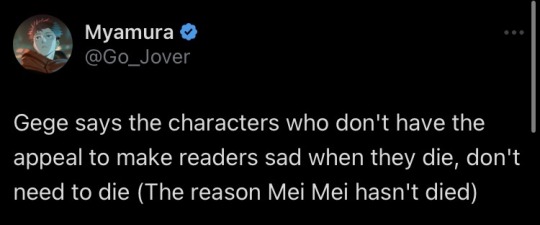
i’ve seen a lot of people saying that this is a bad way to write a story, and i couldnt disagree more. from a writer’s perspective, there is no reason to kill off a character if it’s not going to have impact.
in any case, i think this reaction points out two things i’ve noticed about the jjk fandom.
i. jjk fans prioritize enjoyment of characters over the plot
which is fine, i guess. i’m not gonna begrudge any readers the space to enjoy their fav characters. however, what i disagree with is the constant trashing of gege and jjk as a story because the narrative doesnt treat the characters as you want it to.
i mostly talk about these things from the perspective of someone who has been writing for a while, so i will take a second to acknowledge from the reader perspective. it’s easy to get attached to characters and see them as real people in your life.
but they arent real people. they only exist for the author’s intentions. every time i see someone complain that “x character only died because plot” i just think “yes?” characters exist for the plot. they exist to serve the narrative. they live and die for the plot, and that isn’t a bad thing. this is a story. that is how stories work.
with characters like gojo or choso, it’s easy to look back and see their character arcs and how their ends fit their purpose in the story, but i think people get so caught up in wanting to fuck the character, or fanon, that they forget their original purpose is to do what gege wants them to do.
this is a war against the most powerful, most evil sorcerer in history. of course characters are going to die, and of course it’s going to be characters we love. it’s honestly unrealistic to expect anything else.
and i think it’s really disrespectful to say so many rude things to gege because he is thinking about the story he wants to tell, and not the story that best suits your favorite character.
ii. few people want to feel anything from what they’re reading anymore
which again, is totally fine, but maybe read something else?
tragic stories have existed and enjoyed immense popularity for millennia. and theres nothing wrong with that. there’s nothing wrong with authors intentionally stirring up their readers’ emotions.
i wanna bring attention to the origins of the words “tragedy” and “catharsis”
“tragedy” is a genre that stems from greek drama based on human suffering and the terrible or sorrowful events that befall the main character. the intention of of tragedy is to invoke “catharsis”
“catharsis” is commonly used to refer to the purification of thoughts and emotions by way of expressing them. in terms of tragedy, this refers to arousing a negative emotion with the intention of expelling it so the audience can walk away feeling relieved.
for all intents and purposes, jjk is a tragedy. it’s meant to make you feel sad. that’s gege’s intention. yet every time people feel upset by a specific event, they call “bad writing.” if anything, according to what jjk is, it’s good writing if you feel sad.
i have seen some people say that jjk wasn’t set up this way, and i disagree so strongly that it’s hard to comprehend.
jjk0 ends with gojo having to kill his best friend, his one and only. tragedy. yuuta’s story is tragic too, having cursed rika and accidentally isolated himself just because he didn’t want her to die.
jjk starts with yuuji faced with execution just because because he wanted to honor his grandfather’s dying wishes. within a handful of chapters, there’s yuuji’s “death” and junpei, and there’s a clear set up of tragedy and repeated loss, despite characters giving their best effort.
i could get into how this relates to my interpretation of the themes of jjk, and sharing burden/responsibility to be stronger together, but that’s another point.
tldr; the point of this post is to say that gege killing characters and making readers feel sad is not bad writing or a bad narrative choice. it’s true to his intentions and the essence of jjk. if you don’t like that, then don’t read. but there’s no reason to disrespect gege and his hard work just because it’s not your cup of tea
#jjk spoilers#jjk leaks#jujutsu kaisen#jjk#gege akutami#gojo satoru#choso#nanami kento#jjk 263#geto suguru#okkotsu yuuta#yuji itadori
307 notes
·
View notes
Text
"you are me."

i have a lot of thoughts on this whole scene, both shipping and non-shipping ones. the relationship between yuuji and sukuna is honestly the most fascinating and complex one that i have seen in anime, and one of the reasons for that is just how much these two actually understand each other, which i don't think a lot of people realize. yuuji and sukuna see right through each other, more than anyone else does, and i think that's why their bond is far more personal than it seems to be.
yuuji and sukuna are enemies. they hate each other for their opposing ideals and characteristics. yuuji is caring, empathetic, protective, kind, and willing to put his life on the line for both friends and strangers. sukuna is narcissistic, self-absorbed, indifferent to suffering, murderous, unfeeling, and unconcerned with any life other than his own. they seem to be polar opposites in every way, so why would yuuji say something as contradicting as "you are me" to sukuna?
i think it's widely overlooked just how complex yuuji's character is. he's overall a "sweet" person, but he isn't very stable (he has been described by quite a few characters as being a bit "crazy"), he has a high tolerance for disturbing or gory things (he took learning about curses and fighting them very easily), he doesn't question the danger he's been put into (he actually runs headfirst into it), and he can be really violent and vengeful as well.
this is all explored very well in his confrontation with mahito, where he also says "i am to you" to the curse.

why are these scenes so different? mahito and sukuna both killed people yuuji knew and cared about as well as strangers that yuuji would die to protect. shouldn't yuuji be approaching sukuna with the same hate, disgust, and vengeance that he shows to mahito? shouldn't he be lashing out and making sukuna pay for all that he did?
why is he showing his "crazy side" to mahito but not to sukuna?
to give some context to this scene with mahito, the curse wanted yuuji to accept their similarities. and, in the end, yuuji did.

yuuji is acknowledging that he serves as nothing more than a weapon to keep killing the curses of the world, perhaps with no other deeper purpose than that. just like curses only exist to bring misery and prey on humans, yuuji's sole existence at this point is just to act on the orders of sorcerers: to keep eradicating curses and eventually help kill sukuna by dying with him. he doesn't need more meaning or roles than that.
but sukuna doesn't see yuuji as just another cog. he doesn't respect yuuji, true, and he loathes to give the brat any kind of credit. but he knows yuuji is the only one who really, truly cares about sukuna's devastating impact. the death of innocent strangers doesn't affect others quite as much as it does yuuji (even nanami in the vs mahito arc noted how much yuuji cared about the suffering of others).
and many of the other sorcerers are also not as horrified or repulsed by sukuna's actions as yuuji is. in fact, sorcerers and curses alike look up to sukuna. gojo actually seems to respect the king of curse's lifestyle. it feels like yuuji is really the only one to truly despise sukuna for his actions and ideals.
and sukuna knows this. sukuna knows how much the suffering of others gets to yuuji. which is why he gives yuuji such special treatment: he saves a unique brand of torment just for yuuji that he doesn't really give to anyone else.
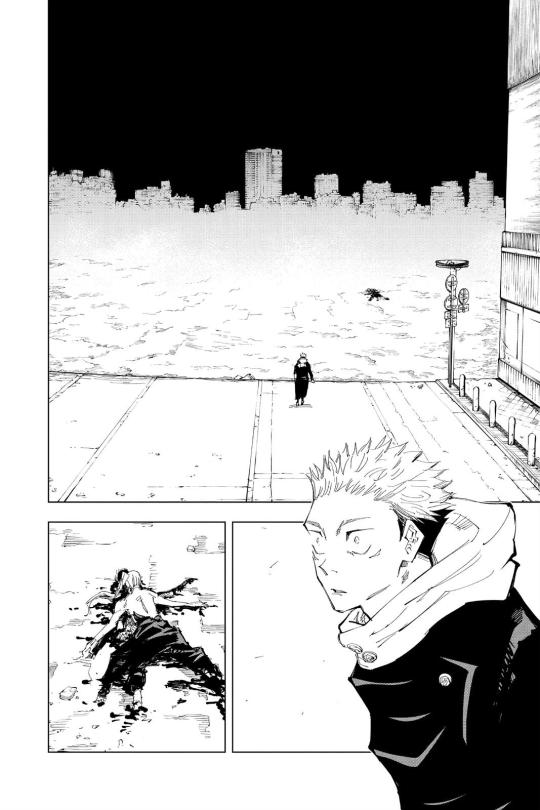
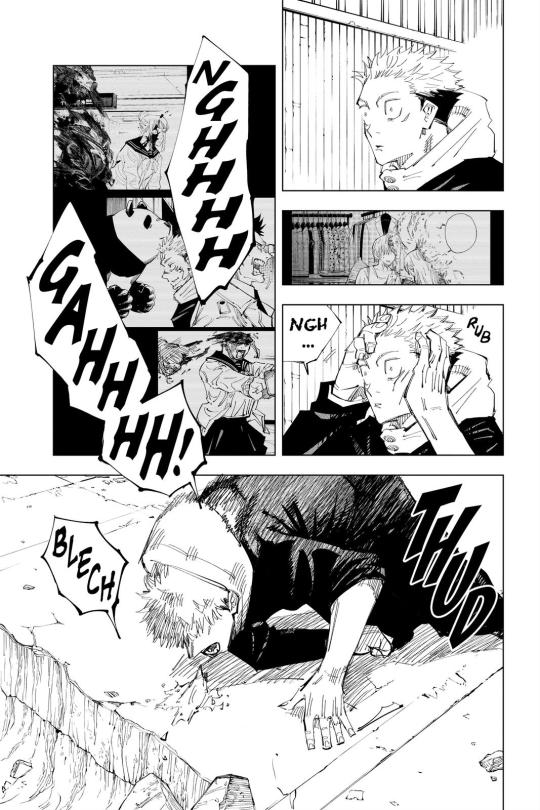
sukuna intentionally returned control to yuuji's body just for yuuji to witness the massive damage and death that sukuna's domain expansion caused. it killed thousands of people, innocent strangers included.
it led to yuuji breaking down, even wishing for his own death. but yuuji is strong and, deep down, sukuna knows this. yuuji doesn't give up and instead uses his rage to fuel his fight with mahito, where he snaps and shows us his vengeful side. he doesn't need any other reason than mahito being a curse to want to kill him, over and over. that is yuuji's purpose. which seems like an uninteresting and boring one to someone like sukuna.
but for all that sukuna keeps calling yuuji uninteresting and boring, he shows a lot of investment in yuuji's growth and in their fights.

he's even invested enough to show disappointment when yuuji lost to choso. (if he thought yuuji was so weak, why did he seem so bothered by yuuji's loss here?)

and then sukuna looked surprised and curious when choso got hit with some kind of false memory empathetic attack that included yuuji in it. he's having a lot of strong reactions to someone he claims isn't interesting enough for him.
sukuna also loves to aggravate yuuji, somehow knowing how to provoke a strong reaction from him.



there's a lot of interesting things about this scene, one of them being that yuuji refers to sukuna as a "curse" which is technically untrue. sukuna is a sorcerer who used a set of cursed objects to send his soul into the future, but he isn't a curse himself.
but to yuuji, sukuna is nothing more than a curse because he doesn't show any sort of positive traits. sukuna's mindset reflects that of a curse since he only exists to please himself and loves to cultivate the kind of negative emotions curses are born of (fear, hate, jealousy, selfishness, etc).
there's also a clever reference to sukuna being a cannibal through yuuji saying "let's see if you can chew up me and my suffering." yet what we've seen throughout this story is yuuji essentially cannibalizing sukuna by eating his cursed fingers, which he calls the taste really gross. so i wonder... what would yuuji taste like to sukuna?
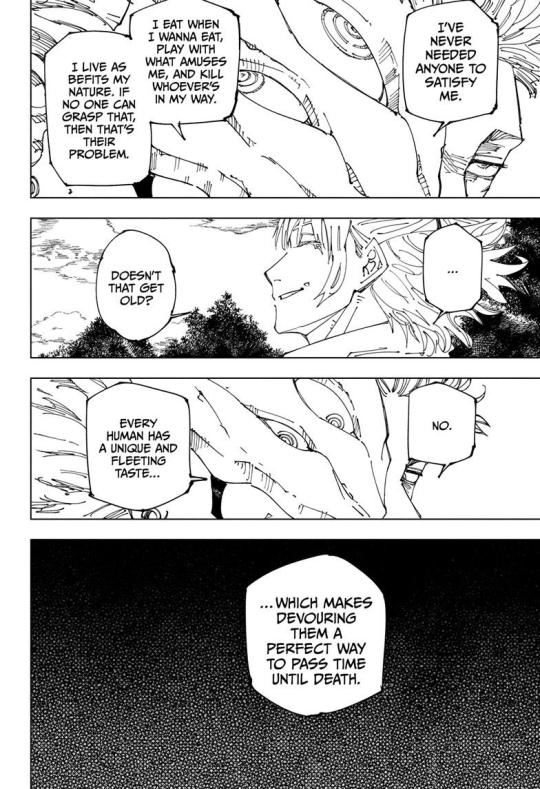
every human has a unique taste but all of them are fleeting to sukuna. there's no actual meaning or savoring to it. it's just a way for him to pass the time until death.
both yuuji and sukuna are cannibalizing as a form of destruction. but while yuuji is eating the cursed fingers so that he can hold all of sukuna inside of him for them to be exorcised together, sukuna was eating humans simply because he wanted to. he ate whatever he wanted because he was at the top. he is an apex predator with no real rivals or threats. it was for a completely self-absorbed and depraved indulgence while yuuji is giving up his life on this plan to save others.
yuuji and his suffering is the complete antithesis to how sukuna's eating only serves himself. which is very interesting to see when yuuji challenges sukuna to "chew him up." yuuji is proving to be more predator than prey and is far more of a challenge than sukuna wants to admit.
but maybe something about yuuji's resilience does please sukuna? maybe he actually finds worth in yuuji never giving up?
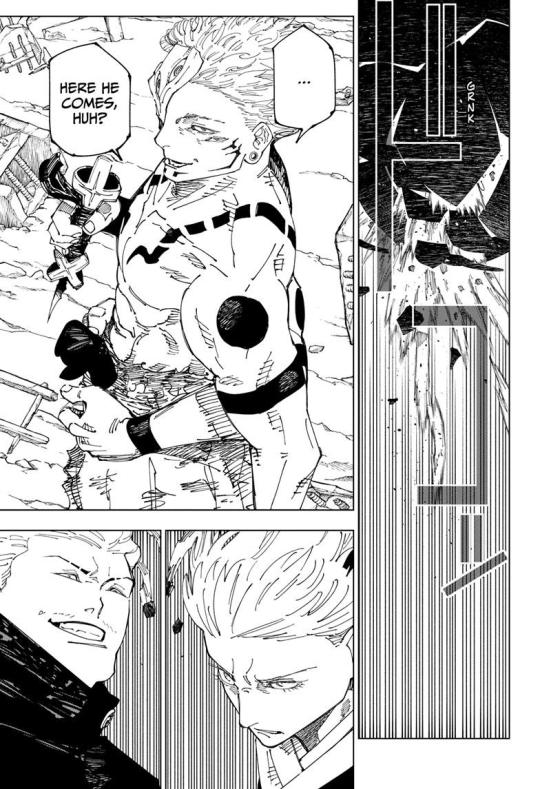
though he still underestimates and discredits yuuji's strength, he actually looks impressed with yuuji and seems even a bit eager to take him on again.
for someone who claims to find yuuji not worth his time, sukuna is showing yuuji far too much special treatment that he doesn't give to anyone else. he even calls yuuji a specific name (kozou) that he doesn't use with anyone else. others are just various offensive terms, but only yuuji seems to have a name just for himself.
sukuna is a really contradicting and complex character, and his relationship with yuuji really shows that.
i've seen a lot of anti-sukuna sentiment after his death, and i understand why a lot of fans hate him and celebrated when he died. however, i think a lot of fans have this somewhat inaccurate view of him being nothing more than a static villain with zero complexities and no chance of any kind of character development.
some of sukuna's most underrated and interesting traits are that he is actually pretty smart (he has an overall plan and is making all the right moves to get there), he's cultured (a poetry snob who hired a chef just to cook him humans instead of eating them raw, and perhaps he even knows more about flowers than he lets on), he shows respect to those he deems worthy and even seeks to learn from them, and he might not actually be the most "evil" person in jjk (which I consider to be kenjaku, but that warrants another post).
overall, sukuna is and has always been more than what he first seems, but a lot of fans don't want to see this or they overlook it.
after sukuna reveals he was an unwanted curse of a child, there was pushback against fans who interpreted this line as sukuna having a tragic backstory that explained his current self.
i understand why these fans don't want sukuna to be a sympathetic villain and i've read posts on how gege writes his villains to be intentionally unsympathetic.

from here (https://x.com/soukatsu_/status/1520796590612566022)
sukuna is the perfect example of a villain that is unsympathetic. he is horrifyingly strong, lives as he pleases, murders people for fun, is a literal cannibal, acts and appears monstrous, and makes our protagonist yuuji suffer over and over again. he represents exactly all the ideals and traits yuuji despises and the two of them are fighting each other because of this.
however, one thing i want to point out is just because sukuna is completely unsympathetic now doesn't mean he couldn't have had an actually tragic past that made him into this.
i believe that sukuna was seen as a curse from his birth on. much like how jogo wanted curses to be the true humans (sukuna calls this jogo essentially wanting to become human) sukuna became purely curse-like to escape being human. whether or not you empathize with him is irrelevant, because after he became the king of curses, sukuna has committed countless irredeemable horrors that even i, as a sukuna fan, don't ever want him to be forgiven or easily justified for doing.
having a tragic past doesn't justify his crimes, it only provides a catalyst for them. it explains why he, who was born human, became more of a curse than some curses are. you don't need to have sympathy for him after that. just like he has no sympathy for those he considers weak and inferior, he has no more reason to be a tragic character.
a lot of people acted like sukuna potentially having a tragic past that turned him into the monster he is now makes him "uncool" or "uncharacteristic" of himself but, to me, it makes his character all the more detailed without changing the fact that he is still purely "evil" and irredeemable.
but does this all make him incapable of character development?
i personally believe that yuuji has been affecting sukuna throughout the whole series, especially in these last few chapters.
i recently came across a post on reddit on why sukuna could never be more than a static villain character. one of the arguments was that gege never intended for sukuna to have any kind of redemption arc.

(https://www.reddit.com/r/Jujutsufolk/comments/16vphxl/sukuna_is_different_from_other_strongest/?rdt=36326)
(now, i couldn't find the original source where this interview came from, and it's not worded very well so i'm thinking it's been quickly translated. and there's always missed meanings and alterations to the original message when translations have been made, especially with japanese. i'm also not sure if the "him" being referred to is mahito or sukuna, but i'm assuming it can apply to both of them.)
this post was made about a year ago, so i assume this interview with gege is also a bit dated now. i think gege is intentionally vague in their interviews because they don't want to reveal too much, but my own interpretation of this post is that gege never intended for sukuna to get any sort of redemption because he is incapable of being redeemed through any kind of love.
and i agree with that. i don't want sukuna to get redemption. what he has done is unforgivable and i don't want him to get off easy for it. but him showing character development is not the same as him getting redemption. and him being affected by love isn't the same as him fully accepting it either.
in these last few chapters, yuuji has offered mercy to sukuna multiple times, despite how even he himself considered it to be a lost cause.


as i wrote earlier, yuuji is the only character who really understands how terrible and curse-like sukuna is. he hates sukuna on this fact alone. yuuji told mahito that his purpose is to kill curses, and sukuna - in the end - is nothing more than just another curse.
so why did yuuji suddenly change all that up and show empathy and genuine concern for sukuna in these last few chapters? why was he trying so hard to convince sukuna that they can co-exist?
one of my sukuita-cult friends (flight-of-death) pointed out that during his fight with yuuji, sukuna explicitly recalled his conversation with kashimo about not needing another person to fulfill him.

while sukuna saying he didn't anyone else to fulfill him was relevant during his discussion with kashimo, it's very interesting that he was remembering his own exact words about it while facing down yuuji, who was making sukuna doubt some of his previous statements.
my friend has convinced me that sukuna and yuuji have found a "reluctant fulfillment" in each other. and i think this is proving to be very much possible.
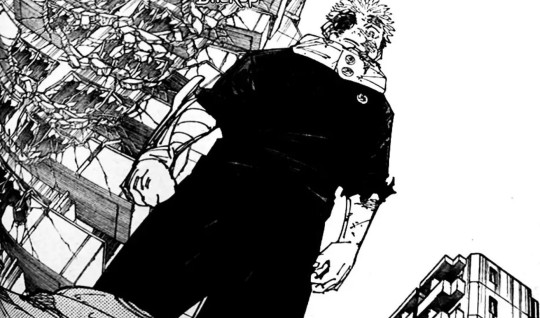
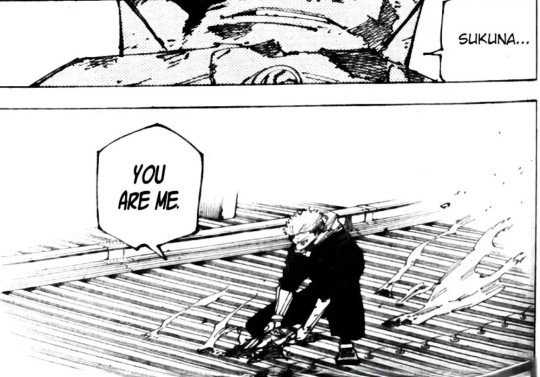

yuuji was alone most of his life. without wasuke there for him, he could have turned into a ruthless monster like sukuna. yuuji has so much physical and emotional strength, but it was the catalyst of wasuke's death that motivated yuuji to use that strength for good. he might have chosen to be selfish and only concerned with his own wants and needs like sukuna did, but wasuke provided the role yuuji needed to be the selfless person he is now.
i think that yuuji, in all his loneliness, found a kind of closeness to sukuna, even if it was unwanted. and sukuna has definitely been affected by yuuji, too.
as sukuna is dying, megumi finally regains control. he notices how sukuna seems to be scared of death.
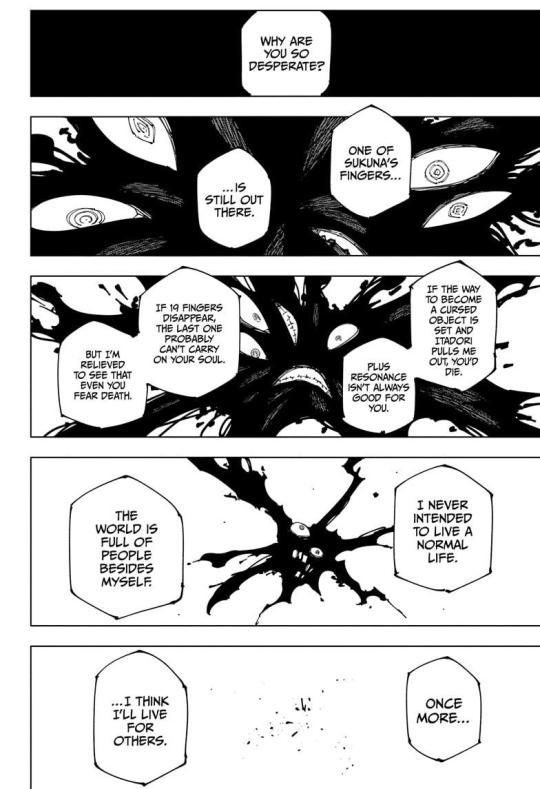
sukuna genuinely does look concerned about dying. his mouths are in the shape of a grin but are turned upside down and look more like actual dread. for someone who claimed that eating people was only a way to pass the time until death, sukuna now looks unwilling to die.
i think that this shows that sukuna gained some sort of respect for life, even if it was only in his will to keep living. he does seem to want to keep existing, and it's interesting that it's what yuuji offered him.
yuuji was created by kenjaku to be sukuna's vessel. the sorcerers wanted to use yuuji as a vessel to hunt down all the cursed fingers so that yuuji and sukuna would die together. no matter how you see it, sukuna and yuuji were bound to end up either living or dying together. that is their fate. but now that he has more power in making his own choices, yuuji seems to genuinely want to share the kinder fate with sukuna: to live together. and if you think about it, them coexisting makes a lot of sense.
sukuna has been described as a natural disaster, so how can yuuji have any kind of empathy for something as devastating and unfeeling as an earthquake or a tsunami? in truth, the human race has been coexisting with natural disasters since the beginning - especially japan, which has weathered many terrible calamities. yuuji is a lot like the embodiment of the resilience and strength needed to survive such disasters, so i think he's more than capable of handling a life with sukuna, especially if sukuna is far more subdued.
and sukuna being allowed to live isn't redemption at all. though it would be a form of character development for him, it would still be one of the most selfish things he could do, as it would mean condemning yuuji to an indefinite amount of time with sukuna.
but yuuji seems to want that. he is willingly offering up the rest of his life to sukuna, for them to live together.

personally, i don't consider this to be a form of redemption in any way. he is proving sukuna's mindset wrong, not forgiving him. just accepting his nature and still offering a way to coexist.
i think that by offering this to sukuna, yuuji would essentially become that person that sukuna claims he doesn't need to feel fulfillment. but it's clear to me sukuna wasn't satisfied with his life in the past, since he couldn't offer an explanation to kashimo about why he chose to cross the ages as cursed objects. he is obviously lying or beginning to doubt his own words.
and i think that's why he chose death.

accepting yuuji's mercy, finding that fulfillment sukuna denies needing, would be very un-curselike of him and he can't have that. he would rather be seen as an inhuman monster than something capable of accepting love.
so in the end, sukuna is doing exactly what gege said he would: rejecting love and rejecting anything that makes him less of a curse.
but yuuji isn't easily pushed away. he kept coming back for wasuke and i think that if he really does care that much about sukuna, that if he's wiling to live with him even if no one else accepts it, he won't let sukuna go without more of a fight either.
they can still find fulfilment in each other. they are capable of coexisting. and if sukuna decides to make that change, it doesn't necessarily mean he's completely broken character. and if they don't get to survive together in this lifetime, there's still a good chance for change if they're reincarnated.
#omg this was way too long im so sorry#please forgive me#i just went and put all my thoughts into one oversized rant#that is too incoherent and could be so much shorter#i think i need to stop writing these until i can do it better#tysm for reading it all if you did#i hope it made some sense#please correct me if im wrong with anything#honey posts#sukuna ryomen#ryomen sukuna#itadori yuuji#sukuita#jujutsu kaisen#jjk#meta
219 notes
·
View notes
Text
Did Levi lost his will to live after Erwin died?

Fandom is a space for creative freedom—where we can explore, celebrate, and even romanticize our favorite characters in ways that resonate with us. That’s part of the beauty of being in a fandom. We’re free to ship whoever with whoever. But what’s disheartening is the toxicity that comes from fans who insist their ship is the only canon one, especially in the Attack on Titan (AoT) universe. The truth is, unless Hajime Isayama explicitly confirms it, every ship is speculative—and that's okay. What isn't okay is deducing a character's whole convictions and personality just to justify their ships.
I’ve supported Levi Ackerman ever since his debut in Season 1—long before I became a Levihan shipper (yes, I’m a newer recruit in that camp, this happened after watching the Anime thrice and reading the manga). And if you’re curious why Levi is my favorite character, I have a long-ass explanation for that elsewhere. But here, I want to focus on how some Eruri shippers portray him—and why that portrayal often oversimplifies his character to the point of doing him a disservice (something I can't accept. I'm a Levi fangirl waaaay before I became a Levihan devotee).
There’s this persistent claim that Levi "lost his will to live" after Erwin died, or that his only remaining purpose was to fulfill his "vow" to kill Zeke. These statements flatten Levi’s entire identity into that of a robotic, grief-stricken killer whose life began and ended with Erwin. That’s not only reductive, it’s wrong. Levi is one of the most layered characters in AoT, and to reduce him to being “Erwin’s weapon” ignores everything else he represents and fights for.
Let’s unpack that.
During the Return to Shiganshina (RtS) arc, Levi delivers one of his most iconic lines: “Give up on your dream and die.” This wasn’t blind loyalty to Erwin. It was Levi seeing that Erwin had become consumed—not by his duty to humanity, but by his personal obsession to prove his father’s theory. That obsession, left unchecked, was risking everything the Scouts had fought for. Erwin, once the hope of the Survey Corps, had become a slave to a goal that would have no meaning beyond its fulfillment. What would he have done after reaching the basement? Levi recognized this. He saw that hope for the future no longer rested with Erwin—it lived in Armin, Hange, Eren, and the next generation.
That’s why, during the infamous ‘serum bowl’, Levi hesitated. Twice. If he truly couldn’t live without Erwin, if his whole existence hinged on him, he would have injected him immediately. But he didn’t. He made a choice based on what was best for humanity, not just for himself or for Erwin’s sake. That’s not betrayal. That’s growth, maturity, leadership, and most of all—vision.

The so-called "vow" to kill the Beast Titan wasn't some obsessive oath made out of grief or romantic fixation. It was Levi's way of honoring the massive cost of the suicide charge—the death of the commander of the Scouts and a battalion of new recruits. Not being able to take down Zeke would have rendered their sacrifice meaningless. The "cart scene vow" was about justice, not obsession. Levi saw himself as the only one capable of ensuring that their deaths wouldn’t be in vain and that is a very important promise for Levi. A solemn promise that’s why he uses the word vow when remembering his promise to Erwin because he knows that he will do it, he will give justice to his fallen comrades, but it must be done when the time is right.
Even later, when given the opportunity to kill Zeke, Levi didn’t. Why? Because he respected the chain of command—Hange’s leadership, Eren’s plans, and the greater mission of Paradis. If Levi were driven solely by revenge or Erwin’s ghost, he would’ve taken Zeke out the first chance he got. But he didn't. He chose duty over vengeance, showing once again that Levi is not a mindless weapon of grief—he's a soldier of conviction.

I am a Levihan worshipper but I COULD NEVER FATHOM TO CLAIM that he lost his will to live when Hange died (inspite of the three panels showing the decline of his mental state?) No. That would be a disservice to everything Levi has fought for. Even after all he endured, he kept going—giving his all, staying mission-focused, continuing to believe in the dream of freedom for humanity. His strength doesn’t come from one person; it comes from his values, his belief in hope, and his loyalty to those who carry that light in their eyes.
Levi’s only true flaw, if you ask me, is that he trusted too much—putting his faith in people who either died or betrayed him. How many scenes did people say they will take care of something and when Levi let them, they died? But that’s also what made him admirable. He followed Erwin not just out of loyalty, but because Erwin gave him a vision, a purpose. Levi, who once lived in the Underground, used his strength for petty survival. Erwin gave him the means to use that strength for something bigger than himself. But that doesn't mean Levi lived for Erwin. It means he lived for the ideals Erwin once represented—and later, that others like Armin, Hange, and Eren carried forward.
So yes, ship Levi with whoever you want—I sure do. But don’t reduce him to a mere extension of someone else's character arc. Don’t use your ship to undermine the complexity of his decisions or the integrity of his journey. Levi Ackerman is not just “Erwin’s,” “Hange’s,” or “Eren’s.” His loyalty was never blind. It was earned, and always rooted in one thing: humanity’s survival and freedom.
PS: I watched the AoT anime thrice and read the Manga so I know what I am talking about (I hope. Hihi)
#levi ackerman#levi aot#attack on titan#levihan#eruri#aot eruri#snk#snk levi#shingeki no kyojin#aot#shingeki no kyoujin levi#hange zoe#hange aot#levi x hanji#levi x hange#erwin smith#aot erwin#commander erwin#eremika#eren jaeger#mikasa aot
56 notes
·
View notes
Text
I think it’s interesting that a particular refrain keeps appearing in Jon’s inner monologue about the Horn of Winter.
They’re not wearing skins, Jon realized. That’s hair. Shaggy pelts covered their bodies, thick below the waist, sparser above. The stink that came off them was choking, but perhaps that was the mammoths. And Joramun blew the Horn of Winter, and woke giants from the earth. He looked for great swords ten feet long, but saw only clubs. Most were just the limbs of dead trees, some still trailing shattered branches. A few had stone balls lashed to the ends to make colossal mauls. The song never says if the horn can put them back to sleep. [..] “So how did you come by your other names?” Jon asked. “Mance called you the Horn-Blower, didn’t he? Mead-king of Ruddy Hall, Husband to Bears, Father to Hosts?” It was the horn blowing he particularly wanted to hear about, but he dared not ask too plainly. And Joramun blew the Horn of Winter, and woke giants from the earth. Is that where they had come from, them and their mammoths? Had Mance Rayder found the Horn of Joramun, and given it to Tormund Thunderfist to blow?(Jon II, ASoS)
Lady Melisandre watched him rise. “FREE FOLK! Here stands your king of lies. And here is the horn he promised would bring down the Wall.” Two queen’s men brought forth the Horn of Joramun, black and banded with old gold, eight feet long from end to end. Runes were carved into the golden bands, the writing of the First Men. Joramun had died thousands of years ago, but Mance had found his grave beneath a glacier, high up in the Frostfangs. And Joramun blew the Horn of Winter, and woke giants from the earth. Ygritte had told Jon that Mance never found the horn. She lied, or else Mance kept it secret even from his own. (Jon III, ADWD)
Jon turned in his saddle, frowning. And Joramun blew the Horn of Winter and woke giants from the earth. That huge horn with its bands of old gold, incised with ancient runes … had Mance Rayder lied to him, or was Tormund lying now? If Mance’s horn was just a feint, where is the true horn? (Jon XII, ADWD)
Repeated phrases in a character’s inner monologue are always important to their development (e.g., “promise me, Ned” or “wherever whores go”). The refrain “And Joramun blew the Horn of Winter, and woke giants from the earth” is repeated four times in Jon’s. That may not seem like much, but then we get to Jon’s final chapter in ADWD:
Wun Weg Wun Dar Wun howled again and gave Ser Patrek’s other arm a twist and pull. It tore loose from his shoulder with a spray of bright red blood. Like a child pulling petals off a daisy, thought Jon. “Leathers, talk to him, calm him. The Old Tongue, he understands the Old Tongue. Keep back, the rest of you. Put away your steel, we’re scaring him.” Couldn’t they see the giant had been cut? Jon had to put an end to this or more men would die. They had no idea of Wun Wun’s strength. A horn, I need a horn. He saw the glint of steel, turned toward it. “No blades!” he screamed. “Wick, put that knife …”
It’s a rather peculiar narrative choice to have Jon think about needing a horn to command a giant right before his death. Especially since the Horn of Winter’s very purpose is to wake (and potentially command) giants, whom Jon has been in communion with since ASoS.
The fandom at large believes the old, chipped warhorn in Sam’s possession might be the Horn of Winter. While that’s a great theory, I think there’s an important narrative distinction to make: the Horn of Winter exists squarely in Jon’s storyline. Though Sam’s POV has made callbacks to the warhorn, signaling that GRRM wants us to remember its existence, the Horn of Winter’s lore and purpose are explored exclusively in Jon’s chapters. Even when it appears in Sam’s narrative, it’s tied directly to Jon through their conversations. Sam’s warhorn may be a Chekhov’s gun, but resolution to the Horn of Winter must come through Jon’s arc. Its purpose has always resided with him, so he should be the one to blow it.
#people thinking sam or euron will blow it when jon has spent three books literally talking himself into doing it#ijbol#look at our lord commander dawg#he tryna bring down the wall 💀#jon snow#valyrianscrolls#I also forgot to add but another important thing to remember is that jon has been learning to communicate with giants!!#he’s witnessed people use the old tongue since his time with the wildlings esp when communicating with giants#he also has a ton of teachers: tormund and leathers and idk possibly borroq#so we have ample setup for Jon learning to communicate with giants#and when he can’t do it he'll just use THE giant communicating horn instead -- as he thinks to do in adwd#like idk guys that feels like the least subtle foreshadowing ever ajsskebjenfrnhfrf#asoiaf#horn of joramun#horn of winter
82 notes
·
View notes
Text
What if we were both magic prodigies and it otherized us in different ways and we devoted ourselves to protecting a family member who has general other goals & priorities. What if we both did self-sacrifical devotion in opposite ways.
What if we were dark mirrors of each other and where I've grown overcontrolling you've grown complacent. What if, bought as a servant into a pretty loving home, ownership and control is what love looks like to me, and to you neglected and lonely growing up, love is gratefully taking any scraps of it you’re lent.
By belonging to someone, even if she comes back injured or fails at finding Delgal, she feels like she belongs and is cherished, by owning someone he feels safe in them not leaving him.
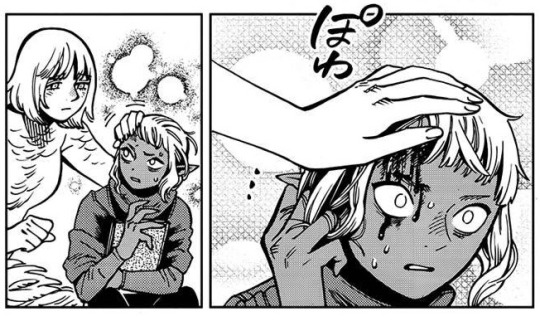
She’s what’s tethering him do you see… And he’s the only thing giving her direction and purpose in her state. She needs a compass and he needs a support.

They’re both so out of it 😭 It’s the weirdly intense and unearned mutual trust and reliance on each other?? They’re each other’s weird little comfort codependent teddy bear. Or at least they were headed towards that before SHE DIED THEN HE DIED THEN THEY BOTH FORGOT ABOUT EACH OTHER AND NEVER MET EVER AGAIN. Though she’s also the guard attack hound keeping him safe… And vice versa he heals her and can rewrite her very being with just one wave of his hand. They’re both so so mentally and physically vulnerable both but they cling onto each other. They can’t perceive things accurately but despite it all someway somehow they stumble into something closer to resembling companionship just before they both die. Falin is just that kind and Thistle is just that lonely. Overworked.
We both haven’t lived for ourselves in a very long time, haven’t we.
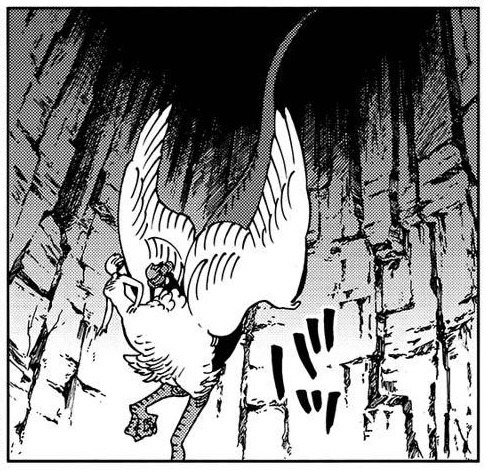
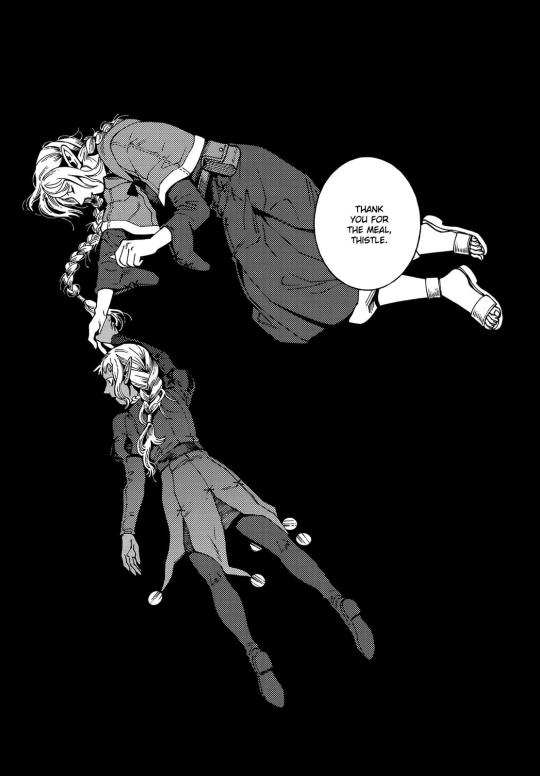
They both have a similar devotion to the people they love but again the difference is that Thistle starts overtsepping while Falin is self-effacing. The other difference between them is that people care about Falin <3 People have given up on Thistle long ago, and he has given people reasons to, while people refuse to give up on Falin. Yaad has a mini arc about it dw about it it’s ok he’s not all alone in the end 😭😭 He reached out for Marcille’s hand but they already all wanted to help him, they just had to be given the chance to, Yaad just had to be given the chance to, it’s okay I’m okay
Hey what if we learned to get in touch with our own identity and the world around us and living in the present again through being in the worst codependent situationship ever.
Falin and Thistle sitting in a tree, sucking on flowers together because they’re h-u-n-g-r-y 💕💕💕
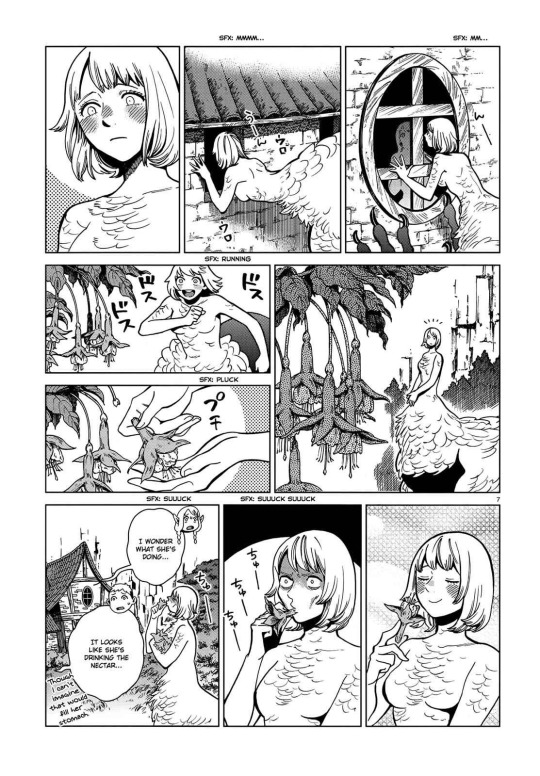
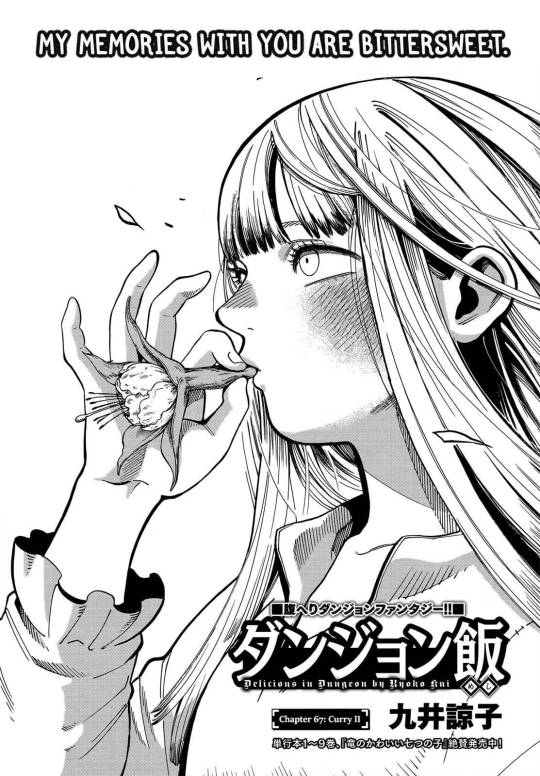
I bet he’s only ever thought of flowers as useless ornaments. Weak weeds. But she shows him they’re tasty and useful and good and pretty in their own right too and deserve existing without proving their worth and waaa <33 Thistles…... Did you know thistles taste sweet if you remove the thorns and eat them?
"Even as a chimera, her kind nature remains" you can’t suppress her in the way that matters. You can’t soothe him in the way that matters. It’s doomed. You’re doomed. It’s all doomed. Save me.
#Spoilers#dungeon meshi manga spoilers#Thistle#falin touden#thistlin#OOOOH UNHEALTHY RELATIONSHIP THAT SOMEHOW WORKS OUT SAVE ME#I need them to be traumabonded kittens to not separate post-canon#I’m seeing a raise in post-canon thistle content/interest which makes me v happy#Fumi rambles#Falin learning to disobey orders with Thistle is one of my fave things. EAT THAT CURRY GIRL!!!! Nvm that it’s gonna get you killed#It’s good for the character arc#Falin and thistle sitting on a web o-b-s-e-s-s-i-n-g <3#This is somewhat of a tldr of my huge thistlin post. Plus some thoughts i had in discord or twitter#Keeping it for another day but tbh if you see their dynamic in canon as her thinking/having picked him as her mate it changes nothing#about her behavior which I find funny. Thistle accidentally claimed himself a parrot mate bc he’s bad with monsters confirmed#Ik my thing of them learning to relax and live in the present moment again is pretty fanon BUT IT’S WHAT KUI POINTED TOWARDS#With her calming him down from a panic attack and eating berries. With the baths for dandruffs. Etc. Thistle hasn’t socialized in a long#time and he wouldn’t if it wasn’t a tool he needed to interact with BUT it’s still socialization and it’s getting him in touch with his#surroundings again even if just a bit slowly but surely!! The Toudens have a superpower in reaching Thistle. Bless#How’s that one post go again. he refuses to develop he's part of the problem he maintains the cycle he's trapped in the cycle.#she's growing she's finding her place she escaped her original role she wants to help people she will never save him she will never save hi#Something something they have to abstract each other bc relationships with humans have always been too charged and unsafe#Only by seeing each other as more concept than person more object than peer can they truly be vulnerable#Like the fuckedupness lf their dynamic and state is WHY they’re so attached. Why their dynamic could be so raw and needy#The stars aligned in the worst way. Mission successfully faile#Tfw we both need to feel needed
258 notes
·
View notes
Note
you seem optimistic so you think we’re still getting shigaraki back? :( i’m really sad the way hori has handled the izuku tenko plotline as of right now like i just can’t wrap my head around this
I mean, I definitely think it's a possibility. We still don't know exactly what happened to overhaul/decay, and how it may be used in the future. We saw Tenko and Deku touch fists; theoretically there could have been some kind of exchange there, or he could be existing as a vestige in some way.
Then again, (and this is going to piss a lot of people off :')) I kind of... get where Horikoshi is going with it?
BEFORE YOU START BOOING!
I think a lot of the discomfort and hurt from fans comes from the perception that Izuku failed to save Tenko. That, by allowing him to die, the narrative is in fact saying he didn't deserve to be save--that Horikoshi himself doesn't believe Tenko truly deserved it. I have also seen a lot of talk about how it doesn't fit in with the ongoing, overarching themes of the narrative, and (while I'm not saying these people are wrong) I would like to push back on that a little, because I think there is precedence in the story as to why Tenko's death holds up, despite it being terrible.
The culmination of Tenko's arc broaches a crossroad of two major concepts in the story: heroes, and saving, and what both of those ideas mean. And, I think, in Tenko's death, we get and answer to both, and more importantly, an answer to his overall purpose.
What does it mean to save? In BNHA, the concept is a little vague. I've often people ascribe the "total victory" mindset as one of protection, as preventing any tragedy or harm. Through that lens, Tenko's death therefore is an automatic failure--a nonstarter. HE's dead, so he wasn't saved. The end. However, while "saving" might seem like a simple, straight forward concept, I would like to dig a little deeper, because I think what Horikoshi's doing is much more interesting.
Saving (Deku's definition of it, anyway) is a lot closer to freeing than it is to protecting. Which sounds weird, but I'll do my best to explain. I think the two best examples of this particular nuance to his definition are actually in two characters people tend to forget he saved: Shoto and Gentle Criminal.
Because he did save both of them. Not in the really obvious, black-and-white way he saved Eri, no, but he did save them. And both times were... painful, to say the least.
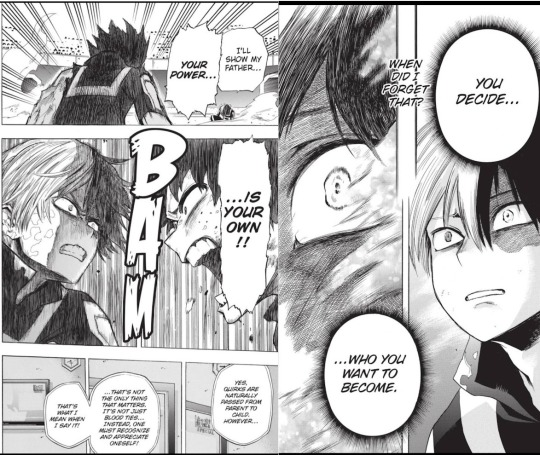
When Deku went after Shoto during the sport's festival, it wasn't, like, nice. He dug his little nerd fingers in where it hurt the worst and dragged out Shoto's biggest fears and insecurities, and then he said GET OVER THEM. Stop letting them control you. Stop letting your father control you. You're your own person, and you get to make your own choices.
He didn't punch Endeavor. He didn't even take pity on Shoto, or say he was sorry. But you know what he did do? Deku cut the leash. AND he damn near killed Shoto (and himself) making sure that Shoto understood that he was free. He gave Shoto back something that he'd been missing, something he was afraid to look in the face; something that Deku picked up, brushed off, and said, "please stop throwing this away, it's important. You're important".
And it works, goddamit.
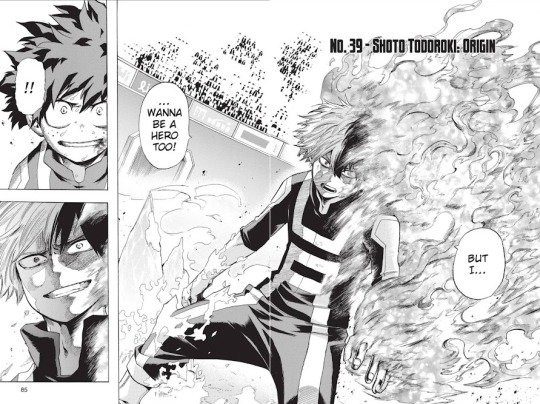
Gentle is both different and similar. In a similar vein, the way Deku saves Gentle is sort of... not obvious. But I think if you look here:
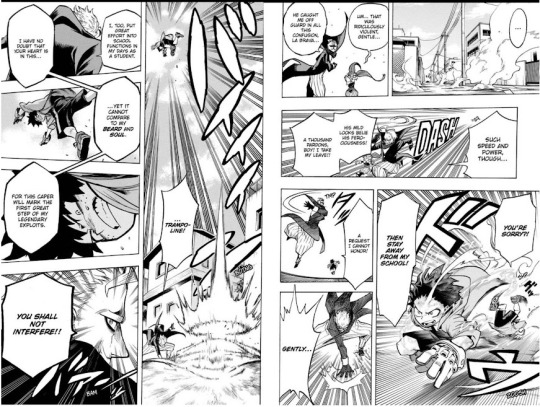
Gentle isn't a bad person. He's ambitious and a little lax about the law, but he never set out to hurt anybody. But we see over the course of his arc how he gets so tangled up in his own pain and his desperation to be seen that he forgets his own ideals, his own morals. In the face of becoming someone, he loses sight of what matters most to him: just like Deku, Gentle wants to be a hero.
Which, in the end, he is. And Deku's the one who pushes him there.
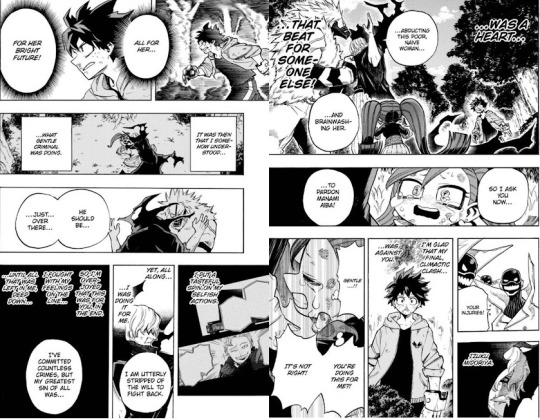
But what about Tenko? What about the crying child inside him? Why wasn't he saved?
When people talk about child Tenko, they often seem to see him as a symbol of the person that Deku's trying to save. But I think that, just maybe, that's wrong. I think maybe, actually, Deku is trying to save Tenko from that child.
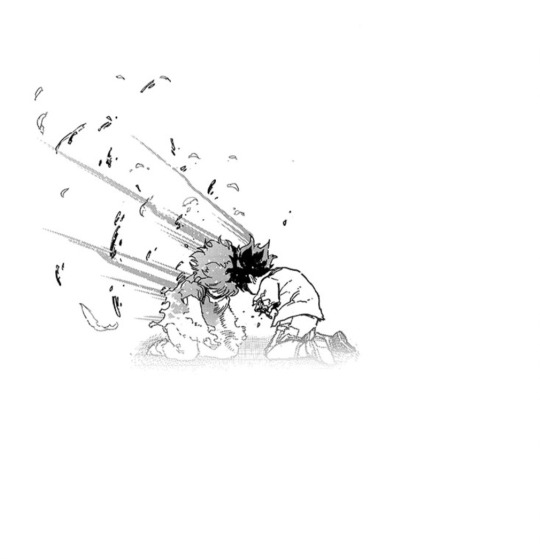
Child Tenko is, in many ways, a symbol of nothing but AFO's power. That is a child stripped of his name, of his original quirk, of his family, of his sense of self. That is a puppet controlled by AFO, without any autonomy of its own. That child is a wound that Tenko cannot escape for as long as AFO still holds any power over him.
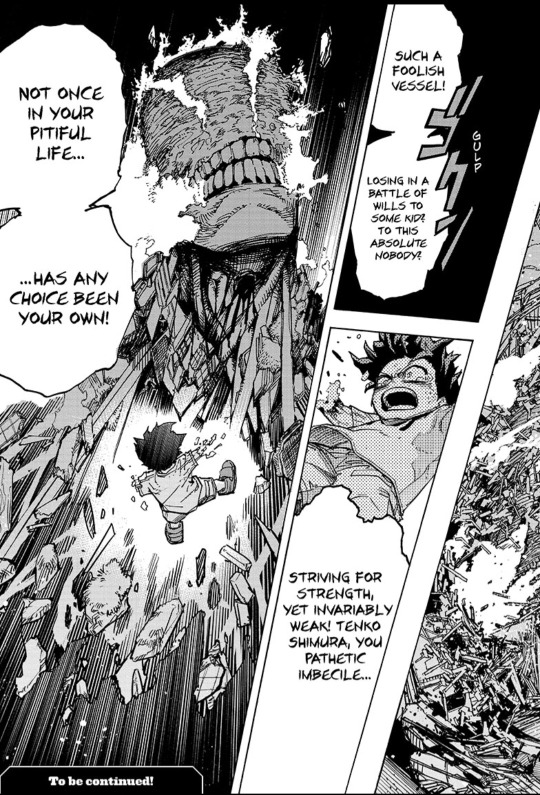
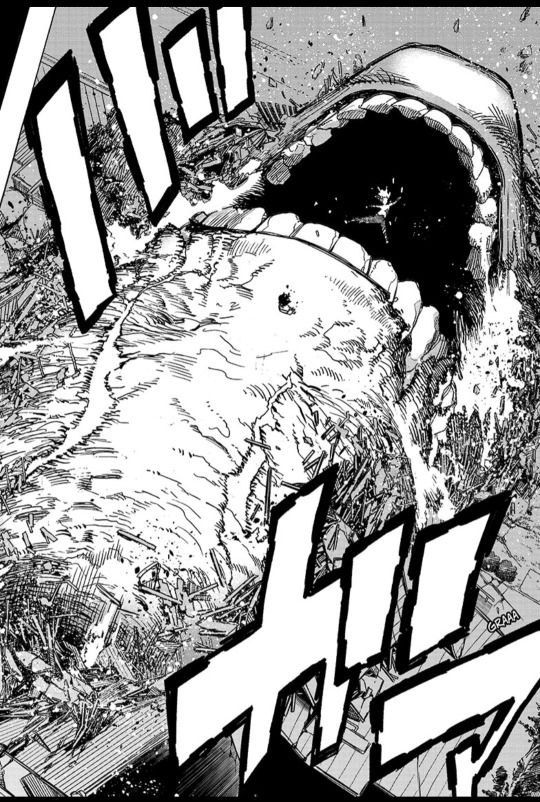
That's why this chapter All Might said that maybe Deku did save Tenko, if he no longer saw the child version of him in the vestige realm. Deku did save him. Because Tenko isn't a child anymore, and he isn't AFO's puppet; he's a free man, for the first time in his life.
A free man who chooses to be a hero.
Heroes get talked about a lot in BNHA (duh), but what is the defining quality of a true hero? Someone who wins? Sure. Someone who saves? Yeah, of course. But the actual test of what differentiates a hero from everybody else is their willingness to sacrifice. To give up everything for the greater good. Even if it hurts. Sometimes especially if it hurts. I mean, this has come up a lot through the manga. Deku running in to attack the sludge villain, Mirio giving up his quirk, Eraserhead throwing himself in front of his students, Edgeshot shortening his lifespan to save Bakugo, All Might standing quirkless in front of the greatest evil of his time-- literally the constant refrain from the narrative has been that being willing to sacrifice it all is what makes a hero a hero.
Tenko's final wish from last chapter is gut wrenching, but: he wanted to be a hero for the Villains. The rest of the world can rot for all he cares, but his friends, those disenfranchised, hurt people that everyone else gave up on? Those people who have never been saved, those people who have never been protected... he wants to be their hero. In the face of danger, of certain doom, he is a free man, and he has a choice.
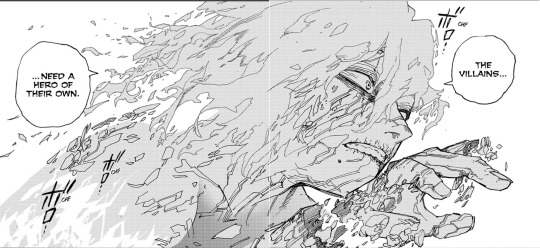
So he makes a sacrifice. His final act is to become a hero. For them.
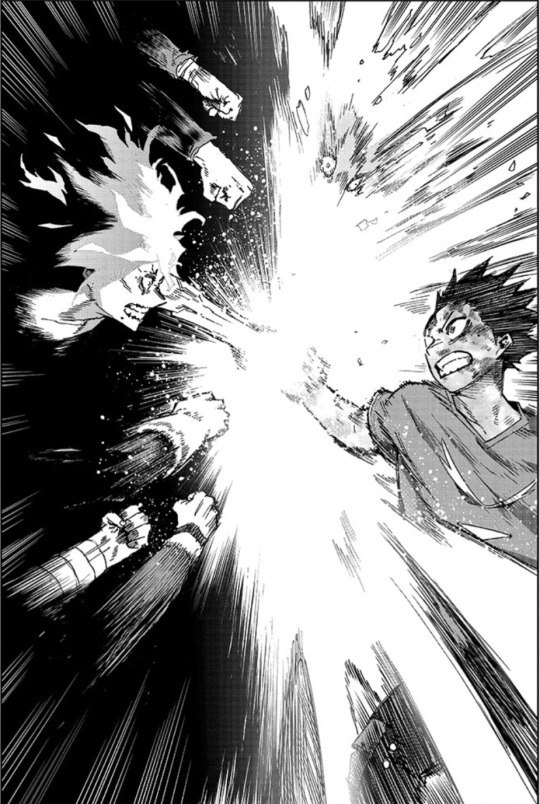
Cue the sobbing tears.
Additionally, I think it's relevant to point out here how strongly the narrative has advocated for victimhood to be divorced from being a perpetual self-identity. It really emphasizes the power of choosing to rise above your situation and pain to help other people, while also suggesting that your pain does not excuse you from hurting people. You can be a victim and you can be a perpetrator; they are not mutually exclusive. And because of this, after Deku saves Tenko, he does not owe him. He saved Tenko, but he could not keep him alive, and... I don't think that it's about Tenko deserving or not deserving to die. It's just that Tenko had reached a point of no return where his only choices were to die a slave or die free and he broke his shackles. But he was always going to die. Doomed by the narrative, both literally and figuratively. We can argue all day as to what degree of responsibility he holds for his actions as a highly abused, traumatized, often shell of a person. But the point is that at every junction of the story, Tenko (and the story around him) escalated until he was trapped. There wasn't a way out, and it's heartbreaking, and maybe that's the point.
I'm not saying it's fair. I'm certainly not saying you have to like it. But... I don't know. I don't feel like this is some completely out of pocket, off-the-rails end that destroyed all its characters. And who knows! Maybe Tenko will be brought back later. Maybe the epilogue will get progressively worse and I'll hate it. Maybe I'll finally get some sleep and regret writing this at all. I have no idea. Really. But we're all in this together, so these are my thoughts right now :)
#bnha spoilers#bnha 424#shigaraki#like I said I know this will piss a lot of people off who really really don't like tenko dying which is#like if you think I'm being dumb and wrong that's fine you can tell me but at least be nice T-T#I'm sad about tenko too okay
201 notes
·
View notes
Text







This is how I will remember them... In love, fighting for each other. Fighting for their love. I'm not gonna let some lazy / shitty writing take that away from us. Season 6 doesn't exists. The June we knew would never have sacrificed Nick like that. The Nick we knew has never been a " fucking nazi ". He was so much more complex than that. I mean, c'mon, even Serena and Aunt Lydia can have their " redemption arc " but not him ? I hate what they did to them. Everything is so fucking out of character, it makes no sense. They wanted to kill Nick ? ( Even if he's supposed to be in the Testaments ). Okay. But let his death be meaningful. Let him die with purpose. So no, I reject this ending. I reject everything they've done. To me, it doesn't exists.
Love prevails. Always.
#nick x june#osblaine#the handmaid's tale#june osborne#the handmaids tale hulu#the handmaids tale season 6#max minghella#nick and june#tht season 6
53 notes
·
View notes
Text
How i think arcane s2 fumbled Viktor. Coming from a disabled person
Not proofread we die like all my favorite characters
As previously mentioned, I struggle with chronic pain. I have POTs and probably EDS now that I think about it, and I use a cane on bad days since at times walking long distances is very painful
I started watching arcane shortly after discovering my own disability and I was SO happy to see a well represented disabled character, guess who my favorite character is (hard mode)
Anytime there’s someone with a physical disability represented in modern media, they’re never allowed to just… be disabled, casually. Yes disability massively affects and changes one’s live immensely, but it’s not the only all-encompassing trait of their personality. A lot of the time when I see a disabled character, they’re just there to be disabled. They don’t get a character arc outside of their disability… or much of a personality either (9 times out of 10 their usually always paralyzed in a wheelchair too, but that’s a different conversation)
And sometimes having a characters arc revolve around a disability is acceptable, but it’s not ok to have a token disabled character and do nothing else with their plot line. Disability is allowed to be a part of their story, but it doesn’t have to be the whole story. Make your disabled characters people with a disability, not a blank slate token character.
And that’s why I was so pleased with Viktor in season one. He exists With his disability, not despite it. It was very refreshing to a character have a very defined personality and purpose outside being a token disabled character. Yes of course his disability is a huge part of his story, but it’s not the entire story.
Now how did s2 fumble?
In s1 I think viktors descent into illness was well written, I was kind of expecting his disability to be a big part of his overall character arc in the first place (as it so often is) but in s2 I feels like the writers almost forgot that Viktor was dying of cancer … not trying to perfect himself
I was so excited to see what s2 did with his character arc, and I just ended up.. disappointed. On surface level i loved Jesus!viktor just as much as the next fan, but when you dig deeper into his story it felt so icky
Whenever a disabled person is represented, not only does their character arc revolve around disability, it has to revolve around “fixing” said disability. And a big pattern I see is many character arcs having an undertone of radical acceptance. I.e “you where never broken, you just needed to accept yourself” “you just need to love your disability as a part of you”
No… you don’t have to love the part of you that’s actively causing you pain and lowering your quality of life, or actively killing you like Viktors terminal illness.
Self acceptance with disability is all fine and dandy, but it is SO overplayed and overwritten. You’re allowed to be frustrated with your disability, and learn to move past it.
The big point is Viktor was never trying to “perfect” himself in s1, he was trying to live.
In s2 they took the idea of Viktor working to cure his terminal illness and ran with it. They blew his arc so wildly out of proportion until he literally became a god obsessed with “perfecting” all of humanity.
And that just felt.. icky. It didn’t feel like Viktor. The Viktor in s1 had a dream of helping his people, of using his creations to uplift everyone! He never would have wanted to force all of humanity into “evolving” without their consent. And do not even get me STARTED on how he completely lost his autonomy to the hexcore, and in turn took it from so many people. That deserves a post on its own
I was so excited for the arcane writers to do something creative with his character arc, but no. Once again a disabled character fell victim to their entire arc being about fixing their disability, only to end with radical self love and acceptance
And the thing is I could get behind an arc of Viktor healing! He deserves to heal and live his life happy and healthy, but to me and him all of a sudden obsessed with “perfection” felt completely out of left field
I think my biggest problem with season 2 overall is that it lost sight of the entire theme of the show. Season one was a beautiful statement about classism, segregation, and how differently it affects people. It was representing real world problems on a scale we could understand. And the best part about s1 was that everyone on the main cast was relatively morally grey, they were humans who had realistic flaws, and made mistakes.
Nobody was shoved into a traditional “good guy/bad guy” box, and that made the show feel so much more real.
S2 was rushed, and for some reason the writers said “actually never mind, we’re going to bend everyone’s morals out of proportion so we can have a big bad villian we all fight at the end”
It had an overwhelming undertone of “forgive your oppressors so we can come together against a common enemy” which felt like a massive slap in the face to everyone who’s actually experience the classism and poverty that arcane represented in s1
I think so many of the problems with s2 could have been fixed or at least explained in detail if we got a s3. I understand as a writer myself that would have been a long, and expensive process that the arcane producers weren’t willing to go through. But I can’t help but mourn the story we could have had if the writers were just allowed to spend more time on it.
Overall, I could write an essay picking apart every tiny detail of arcane in general, so I’ll stop here. I just needed to get this rant out in writing and out of my head, I’m so insanely disappointed and mildly insulted with how the arcane writers treated Viktor, who had such potential
Feel free to share your opinions or completely disagree with me in the comments, please be kind as this is just my humble analysis and opinion.
#arcane#arcane netflix#arcane league of legends#arcane league of lesbians#arcane jayvik#arcane viktor#viktor league of legends#the machine herald#viktor arcane#arcane rant#rant post#arcane critical#arcane analysis
68 notes
·
View notes
Text
nope, still annoyed at the fact that Andor gave itself the neatest, most poignant way out of both the question "why is Bix not around in Rogue One" and "at what point does Cassian start doing things that he actively resents doing" (because so far he doesn't seem to feel a large amount of guilt - yes, he says the faces haunt him, but he seems very convinced he can live with it), plus being able to make an actual point about sacrifice while doing it - and then they used it instead for a cheap "badass" moment to end the arc on, even though it once again makes Bix all about her trauma with very little agency and opportunity to show off her skills or qualities, opens a bunch of plot holes and is still just setting her up to die for Cassian's manpain soon.
Because bringing Gorst back into the narrative is actually brilliant. They clearly can't figure out anything else that Bix has going on (not gonna rant about that here. again.), so it only makes sense. But it also actually presents a perfect moral dilemma:
Lonni is running the expansion of Gorst's heinous torture programme
he has likely passed this information on to Luthen, who in turn knows what happened to Bix
Bix cannot move past what happened to her, and clearly has violent fantasies about killing him, suggesting she would jump at the opportunity to kill that guy
killing Gorst would also sabotage or possibly end the torture programme
BUT any attack on Gorst, whose existence and programme is very hush-hush, will also immediately tell the ISB they have a mole very high up
now, you hand Cassian all these cards, and then you give him some kind of mission where he runs across Gorst, and recognises him. You put them in some office alone together, the doctor's back is turned, Cassian has a hand on his blaster - and, understanding that revenge is not worth blowing up their eyes and ears at the top of the ISB because almost nothing would be... he drops his hand, and politely excuses himself, and lets Gorst live.
Then, you have him either confess this to Bix or let it slip on accident. She cannot forgive him, and he cannot agree with her - because it is the greatest possible betrayal of her, but that doesn't make it the wrong choice. Then you have them split over this, and have Bix cut ties with Luthen and all the other rebel contacts too. This could be a more peaceful endpoint for her (she is, at least, free from Cassian and this Rebellion she has no agency in), or, if that is too defeatist, make her last appearances ones where she starts stalking this guy on her own. This way, she actually gets her revenge without needing an assist from the Cool Rebel Guys. So she kills Gorst independently of the Rebels, and depending on how bleak you want this ending to be, she either gets away with it and finally gets to leave Coruscant, or she gets arrested. If she gets arrested, her getting framed as a rebel terrorist for it and it serving to whitewash Gorst's actions to the public, actually boosting the programme, could be very terrible and poignant. But maybe we end on her arriving in some prison camp where she is celebrated as a hero by the other inmates, and hey, we could end it at an ambiguous shot of a rebel ship overhead, suggesting that maybe they're going to be liberated. You know, bring that hope theme from Rogue One back just a little bit.
Anyway, this accomplishes several things that the ending of the Gorst storyline we got does not:
Gorst's return actually serving some narrative purpose over "needs to come back so his death can allow Bix her Moment"
allowing Bix some actual agency and competence that doesn't smack of plot contrivance (instead of a half-minute sequence of her swanning in and out of an ISB building with no explanation or consequences)
moral conflict instead of an oddly unambiguous "you go girl!!" moment that the show has so far always avoided
pushing Cassian further to where he needs to be if they plan on lining him up with his R1-personality even slightly, and putting him more on Luthen's side instead of pitting him against him
allowing them to keep their mole without this becoming a plot hole
give Cassian something to feel genuinely guilty about without that compromising his belief in the cause or needing to fridge yet another woman to do it
#the plot hole in question being that there's no way in hell luthen would sacrifice lonni just to give bix her revenge#he's way too valuable and killing gorst gets them very little#yes he's heinous and yes it is in their interest to stop the torture but there's no guarantee it even will stop the torture programme#and it's just handing the empire a propaganda win on a silver platter it's a deeply stupid move from luthen's pov#and also. that went off wayyy too smoothly. she wasn't even in uniform or anything she just appeared in there and only one guy saw her?#anyway#sigh#this script is KILLING me#andor#andor critical#dr. gorst#andor spoilers#writing#tony gilroy#explain this scene please i'm waiting#bix caleen#i promise i'll stop ranting now#long post
42 notes
·
View notes
Note
Crazy to me that people follow you for a horror comic then get upset with you when it’s a horror comic.
Killing children in horror is a well regarded theme in horror. It’s not “wow it’s so cool when kids die” but the fact that the story addresses vulnerability and the narrative purpose that serves. Like I can vaguely understand why people would be so shocked to see a well beloved character die, but y’all signed up for that when reading a HORROR comic.
Anyways as someone who is just starting to get into making horror comics I deeply deeply admire your work here. You’ve been doing an amazing job at building suspense especially with traditional webcomic style of page-by-page release. Keep it up, I hope you are having as much fun making this story as it’s been to read :D
Thanks so much for this ask, and for reading Infested! I'm wishing you, as well, absolute best of luck and much glee in the creation of your own horror comics! It's one heckavuh ride, making comics, that's for sure, but even if not every part of the process appeals to you, the end result will always be worth it. Longer stuff ahead.
As one person in the Infested Discord pointed out, I can't understand people (there have been three so far) griping about Tails being killed for the narrative when Maria, who is also very much a child who was murdered for the narrative, exists in a game that isn't labeled "horror."
Do these same people have a problem with that? Do they angrily write to Sonic Team about it, claiming the E10+ rating for "mild cartoon violence" was not enough of a warning? Or do they let that slide because Maria's death is integral to the story of Sonic Adventure 2, and to Shadow's character arc. As if Tails's death doesn't fill a similarly important role in Infested.
I seem to not be allowed a bit of trust that I know what I'm doing by killing Tails. It's treated like a mistake. That last person called it a "plot hole" (???), sharing a similar sentiment with someone else on Twitter that felt that Tails was simply too smart to die. Whatever that means. Never once do these folks consider that it is IMMENSELY important for this story that Tails dies, and does so in the way that he does. I can't simply change who dies, because who dies is deeply important to the soul of Infested. To the point of it. It, and it's sequel.
Yes, Tails's death is just as important to the sequel.
The story isn't over yet, and the means in which that event played out haven't been revealed. As many obnoxious people have already said many times before me; Patience is a virtue.
64 notes
·
View notes
Text
How to Subvert Expectations Without Compromising The Story
Whoo boy, is this a contentious topic with the last few blockbuster franchises. To “subvert expectations” is to do the opposite of whatever your audience expects to happen. Your audience expects the story to go a certain way based on the archetypes and tropes your characters follow, the tone you’ve set for your story, and the level of mature themes that tone allows.
It might mean your long-lost princess doesn’t actually reclaim the throne she’s been fighting for. Or the presumed hero (or any of their straight friends) of the story dies halfway through their arcs. The mentor pegged for death actually survives to the end credits. The villain’s plan actually succeeds, or the heroes fail to deactivate the bomb before it explodes. The “will they/won’t they” is never fulfilled.
Supporters of SE argue the following:
It’s refreshing, novel, new, a fun twist on a classic tale
They like that it’s unpredictable and bold
They’re tired of stories fitting within the same wheel ruts of every other story that came before and like to see creativity thrive
It gives audiences something they didn’t even know they wanted
Haters of SE argue this:
It’s only done for drama at the cost of fulfilling character arcs
It’s a cheap gag that only works once and has zero rewatchability with the same impact
Tropes and archetypes have stood the test of time for a reason - to entertain
Plot holes ensue
When expectations are subverted and the story changes in a more positive light (like a beloved character who doesn’t die when we all think they will), the reaction is not nearly as emotionally charged as when the story changes negatively. Thus, the haters have plenty of evidence of bad examples, but minimize the good ones. Good SE is novel, or a pleasant surprise, or a quaint relief. Bad SE trashes the story and spits on the fans and destroys the legacy of the fandom.
What makes a bad subversion?
Like killing any character for shock value, bad SE takes all of the potential of a good story and gambles it for a string of gasps in the movie theater. It exists only to keep the audience on their toes, or because the writer went out of their way to change the direction of their work when fans figured out the mystery too quickly and now *must* prove all the clever sleuths wrong.
So, say your subversion is making the hero lose a tournament arc when they made it all the way to the final round and the entire story is riding on this victory. They may have stumbled along the way and had some near-misses, but they must win. Not just so the audience cheers, but because this is the direction their arc must take to be at all entertaining and fulfilling.
Then they lose, because it’s *novel* and irreparable consequences are reaped in the aftermath. They lose when, by rights, they were either stronger or smarter or faster than their opponent. They lose when the hand of the author rigs the fight against them and everyone notices.
Sure, it’s not at all what audiences expect, but you, writer, your first responsibility to the people consuming your content is to entertain them. So what purpose does this loss serve this character? How does it impact their arc, the themes that surround them, the message of your story?
Even if mainstream audiences don’t care on the surface about themes and motifs, they still know when a story fumbles. It’s not entertaining anymore, it’s not satisfying. Yes, crap happens in reality, but this is fiction. If I wanted to read about some tragic hero’s bitter and unsatisfying demise, I’d read about any losing side in any war ever in a history book. I picked up a fiction book for catharsis.
On the topic of “gritty fantasy/sci-fi anyone can die and no one is safe” – no author has the guts to roll the dice and kill whoever it lands on. Some characters will always have plot armor. Why? Because you wouldn’t have a story otherwise, you’d just have a bloody, gory, depressing reality TV show with hidden cameras.
What makes a good subversion?
Now. What if this character loses the final round of their tournament, but it’s their own fault? Maybe they get too cocky. Maybe it’s perfectly, tragically in character for them to fall on their own sword. Maybe the audience is already primed with the knowledge that this fight will be close, that there might be foul play involved, but still deny that it will happen because that’s the hero, they won’t lose. Until they do.
Then, it’s not the hand of the author, it’s this character’s flaws finally biting them in the ass. It’s still disappointing, no doubt, but then the audience is less mad at the author and more mad at the dumbass character for letting their ego get to their head.
If you write a character who’s entire goal in life is to win that trophy, or reclaim their throne, or get the girl, and they *don’t* do those things, then the “trophy” had better be the friends they made along the way, that they learned it wasn’t the trophy, it was something *better* and even though they lost, they still won. Even when expectations are shredded, the story still has to say something, otherwise the audience just feels like they wasted their time.
A good subversion does not compromise the soul of the narrative. You might kill a fan favorite character or even the hero of the story, but their impact on the characters they leave behind is felt until the very end. The hero might lose her tournament, but she still walks away with wisdom, maturity, and new friends. Heck, sports movies leave the winner of the big game a toss-up more often than not. Audiences know the game is important, but they know the character they’re following is even more important. Doesn’t matter if the *team* loses the battle, so long as the protagonist wins the Character Development war.
Good SE that should be more popular:
The “Trial of threes” – your hero faces three obstacles and usually botches the first two and succeeds on the third attempt. Subvert it by having them win on the first or second, lose all three, or have a secret fourth
Not killing your gays. Just. Don’t do it. That’ll subvert expectations just fine, won’t it?
Let the villain win
Have your hero’s love interest not actually interested in them because they realize they deserve better / Have the hero realize they don’t want the romantic subplot they thought they did
Have the love triangle become a polycule / have the two warring love interests get with each other instead, or both find someone they don’t have to compete for
Mid-redemption villain backslides at the Worst Moment Possible
Hero doesn’t actually have all the MacGuffins necessary at the Worst Moment Possible
Hero is simply wrong, about anything, about important things, about themselves
The character who knows too much still can’t warn their friends in time, but lives instead with the guilt of their failure
The mentor lives and becomes a bitter rival out to maintain their spot at the top of the charts
Kill the hero, and make the villain Regret Everything
More deadbeat missing parents, not just dead parents
Let the hero live long enough to become the villain
—
Why write a crown prince that never becomes king? What’s the point of his story if all he does is remain exactly who he was on page 1 and learns nothing for his efforts? Why write a rookie racer if he spins out in the infield in the big race and ends his story broken and demoralized in a hospital bed? Why should we, the audience, spend time and emotional investment on a story that goes nowhere and says nothing?
Cinderella always gets a happy ending no matter how many iterations her story gets, because she wouldn’t be Cinerella if she remained an abused orphan with no friends. We like predictability, we like puzzling out where we think the story will go based on the crumbs of evidence we pick up along the way, we like interacting with our fiction and patting ourselves on the back when we’re proven right.
Tragedies exist. There’s seven types of stories and the fall from grace is one of them… but audiences can see a tragedy coming from a mile away. Audiences sign up for a tragedy when they pay for the movie ticket. We know, no matter how much we root for that character to make better choices, that their future is doomed. Tragedy is still cathartic.
What’s not cathartic is being bait-and-switched by a writer who laughs and snaps pictures of our horrified faces just so they can say they proved us wrong. Congratulations? Go ahead and write the rookie broken in the hospital bed. I can’t stop you. Just don’t be shocked when no one wants to watch your misery parade march on by.
#writing resources#writing advice#writing tips#writing tools#writing a book#subverting expectations#subversion
206 notes
·
View notes
Text
Spoiler for Deltarune Chapter 3
Some Gaster, Knight, and Ralsei thoughts I have:
I showed my friend Chapter 3 today, and appearantly If you die to the Knight, Gaster is supposed to talk to you? Didn't happen at my playthrough, as far as I remember...
Is it actually possible to Beat the knight in that Battle?
anyway, I kinda think don't forget is about Ralsei now? Since Susie assured him that He won't be forgotten, and he kinda is with us in the dark.
Also it's kinda interesting that like, I think Ralsei suffers from existential dread (I don't actually know how to use that word correctly) Like not only is he super terrified of the Roaring, but also of just his object breaking, or something, right? I mean we all die eventually, and I think Ralsei knows lightners die as well but, when you are also told that your only purpose is to exist for others, and through "dying" you kinda failed that purpose... that must be pretty scary for someone with such low self worth
I wonder if "we don't exist, we don't Matter" is also a coping mechanism because then the reality of dying becomes less painful? If you never mattered then your death doesn't either.
I also think Ralsei started to realized how deeply unhappy "not being real" actually is for him, so he kinda tries to distract and cope with it, maybe even through the TV Show, and through continuing to tell himself (and Tenna) that he is nothing.
I find him expressing that he shouldn't have feelings, that he thinks he's selfish for having them and, I think he even said that it really hurts him that He is not "enough" for His friends really heartwrenching to read, i don't know they're Just such strong expressions, Just wanted to Put that Here...
At the end of Chapter 3 he does give Susie a lightner smile after she cheered him up, but I don't fully think he is completely convinced yet that he actually Matters, but he's starting to heal, I kinda also wanna see him grow a bit more though, maybe have him Break down at some Point or actually have a "Noelle" Moment. But then again I'm scared we might also part ways with Ralsei at some point because he isn't able to convince himself that He Matters. Spoiler for Ch. 4 but He is the only one without a Guts stat. Maybe that just means he'll gain one, but I don't have such a good Feeling about that right now...
I was also thinking about the kinda obvious "don't escapism too much" metaphore a bit, but it doesn't work that well for me, since... None of These characters are real technically. It's not like Ralsei is a Videogame character with pre-programmed dialogue that will run out of options, at least in a world where every character is a Videogame character with pre-programmed dialogue options, and yeah darkners are a bit more over the top than like, a normal Person would be, but honestly, Most lightworld npcs are the same? Ralsei clearly has more complex feelings than the Idea of the "flat Darkner", and many darkners think about deeper stuff as well. By all means there is no reason why Ralsei shouldn't be considered a full friend, Susie even says that it doesn't matter to her If Ralsei is real or not, and his character arc points in that direction, but right now there are just enough signs to Point in the direction of "Ralsei was right". If for example Dess really Is the Knight, I can easily See her getting corrupt by the darkness to the Point she ended Up looking Like that and with These insane powers, and if spending too Long in the Darkworld results like this then... yeah that's not good. Also again with the Gaster not acknowledging darkners as relevant, even If one of them is a Main character, and the whole "Darkner plushies are okay, but lightner plushies aren't" thing... Is the metaphore Just in a "the lightners make the darkners and all their Problems up completely as they go? That also doesn't make that much sense, otherwise Tenna would've probably mentioned Kris immediatly when He talked with Susie about the fun they Had, or Ralsei wouldn't have talked about that purpose stuff with Susie, it clearly Made her uncomfortable in Chapter one, and I honestly doubt that she really thinks about needing to Server Others or something, unless it's her deep, deep subconciance... I don't know, I just think stripping all the realness of a character away for a metaphore like that... Not the best ending imo, I hope it's some sort of middle thing or something...
Actually yes, maybe that's really it... Kris's meta Story/Arc is "what is it like being a Videogame Protagonist" but from the Angle of "it was out of your control/ maybe even against your will". A story about "what is it like being a fictional character" fits just right in there, no? And if Kris can Rebell against being controlled, why shouldn't Ralsei be able to decise that he actually is real, is allowed to have feelings ect.
When I wrote my general thoughts about Just where I'm currently at in the chapters, I often found myself thinking "dang that Ralsei stuff sure Sounds a lot like Kris right now" I think the two really have more in common than they (or even we) realized.
I don't regret choosing the being nice to Ralsei Route, poor boy...
I'm actually really scared that he is just straight up going to die at the end. I mean, I mentioned "doomed" Ralsei here and there, but doomed doesn't necessarily have to mean death, just ending up alone forever suffering under your own beliefs or destiny ect.
I still haven't really started the Chapter 4 Main Storyline yet, I was just going around Home and Castletown a bunch, so I am optimistically terrified of what's to come next.
#ammi rambling#ammi thoughts during chapter 4#Deltarune#Deltarune Chapter 4#Deltarune spoilers#Deltarune Chapter 4 spoilers#Chapter 4 spoilers#Deltarune Chapter 3#Deltarune Chapter 3 spoilers#Chapter 3 spoilers#Ralsei
20 notes
·
View notes